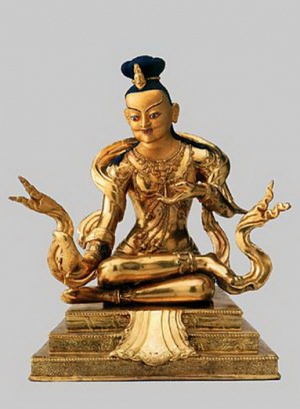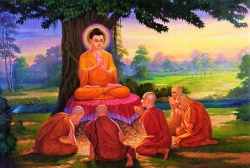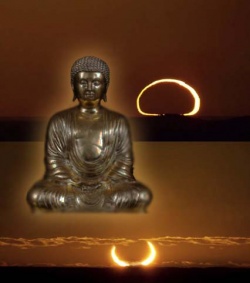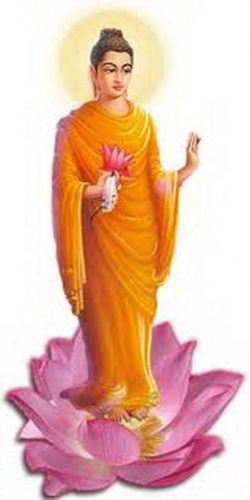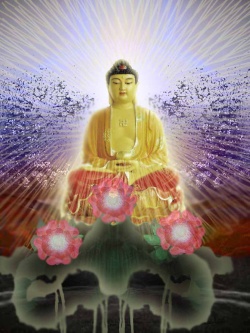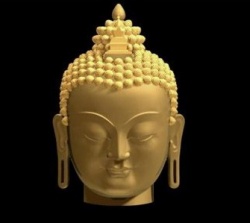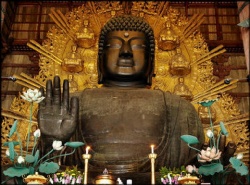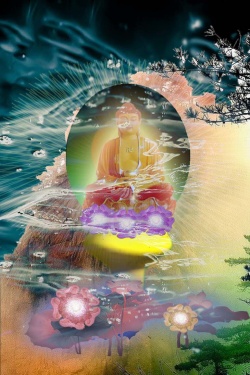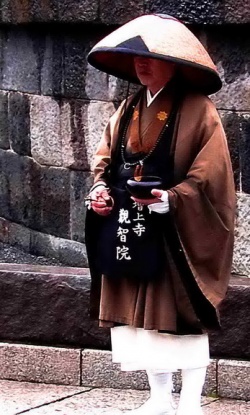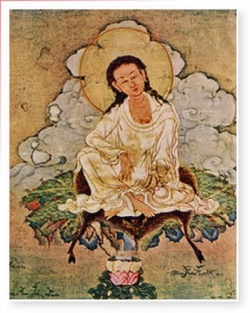Tilopa
Tilopa also known as Tillipa, Telopa or Tailopa (Tib. ཏི་ལོ་པ་) (988-1069) — the most important source of the Kagyü lineage is traced back to the great Indian yogi Tilopa and one of his main disciples, Naropa (1016-1110).
He is also counted among the eighty-four mahasiddhas.
Further Reading
- Abhayadatta, Buddha's Lions: Lives of the Eighty-four Siddhas, Emeryville, Dharma Publishing, 1979
- Fabizio Torricelli and Ācārya Sangye T. Naga, The Life of the Mahāsiddha Tilopa, LTWA, New Dehli, 1995
- Nālandā Translation Committee, 'The Life of Tilopa' in Donald S. Lopez (ed.) Religions of Tibet in Practice, Princeton University Press, 1997
- Roger R. Jackson, Tantric Treasures: Three Collections of Mystical Verse from Buddhist India, Oxford University Press, 2004
- Thrangu Rinpoche, Life of Tilopa & The Ganges Mahamudra, Zhisil Chokyi Ghatsal, 2002.
- XIIth Khentin Tai Situpa, Tilopa, Some Glimpses Of His Life, Dzalendra Publishing, 1988.
External Links
Source
Tilopa (Prakrit; Sanskrit: Talika or Tilopada) (988–1069) was born in either Chativavo (Chittagong), Bengal or Jagora, Bengal in India. He was a tantric practitioner and Mahasiddha.
He developed the mahamudra (Tibetan: phyag rgya chen po) method, a set of spiritual practices that greatly accelerates the process of attaining Bodhi (Enlightenment).
His main student is regarded as Naropa.
Mahasiddha vajra masters always offend duality
The Ka’bab Zhi lineage (bKa’ babs bZhi) of teachings were brought to Tibet by Marpa
They were initially received from Dharmakaya Buddha Dorje Chang (rDo rJe lCang) by the Mahasiddha Tilopa, who transmitted them to Naropa, Maitripa and Marpa.
The lineage was then passed down through Milarépa to the Kagyüd lineage(bKa’ brGyud) of the Karmapas and other Lamas of both Kagyüd and Nyingma ineages.
Ngak’chang Rinpoche comments:
Tilopa is a profound example of the vajra master
He spared no effort in confronting his disciple Naropa with what was necessary. Naropa’s ability to receive transmission was obstructed by a welter of concepts as to what constituted spirituality and Tilopa manifested in the guise of whatever conflicted with Naropa’s conditioning.
Because Naropa believed that Tilopa was the only one who could set him free from the constraints of his incomprehension, he was prepared to undergo repeated shocks to his ideological infrastructure.
Tilopa was entirely politically incorrect from the point of view of Brahmanic society, and Naropa was locked into the Brahmanic paradigm. This was an explosive situation and one that led to Naropa’s realisation."
- "People often think that Naropa’s trials at the hands of his teacher Tilopa are allegorical – but this may be a mistake, because the allegory is real.
The vajra master in today’s world may not conjure in the same way that Tilopa conjured with Naropa, but he or she will still confront the disciple with his or her perceptual obstacles.
The vajra master today will still cause offense to duality by whatever means are necessary.
The disciple today will still complain that the vajra master is ‘unreasonable’ and expect the vajra master to conform to his or her own version of what spirituality should be.
Naropa’s capacity may have been great – but his confusion is not different from our confusion.
The stylistics of our confusion are different from those of Naropa and so the vajra master will approach our confusion as it is. The similarity is that the Mahasiddha vajra master will always offend our duality.
The Mahasiddha vajra master will always insult our duality. The Mahasiddha vajra master will always infuriate our duality."
Life
Tilopa was born into the (priestly) brahmin Caste – according to some sources, a royal family – but he adopted the monastic Life upon receiving orders from a Dakini Buddha whose activity is to inspire practitioners) who told him to adopt a mendicant and itinerant existence.
From the beginning, she made it clear to Tilopa that his real parents were not the persons who had raised him, but instead were primordial Wisdom and universal voidness.
Advised by the Dakini, Tilopa gradually took up a Monk’s Life, taking the monastic vows and becoming an erudite scholar. The frequent visits of his Dakini teacher continued to guide his spiritual path and close the gap to Enlightenment.
He began to travel throughout India, receiving teachings from many gurus:
- from Saryapa he learned of inner heat (Sanskrit: caṇḍalī, Tib. tummo, inner heat);
- from Nagarjuna he received the radiant light (Sanskrit:
prabhasvara) and illusory body (Sanskrit: maya deha, Tib. gyulu) teachings (refer Chakrasamvara Tantra), Lagusamvara tantra, or Heruka Abhidharma);
- from Lawapa, the Dream yoga;
- from Sukhasiddhi, the teachings on Life, Death, and the Bardo (between Life states, and consciousness transference) (phowa);
- from Indrabhuti, he learned of insight (Prajna);
- and from Matangi, the resurrection of the dead Body.
During a meditation, he received a vision of Buddha Vajradhara and, according to legend, the entirety of mahamudra was directly transmitted to Tilopa.
After having received the transmission, Tilopa embarked on a wandering existence and started to teach. He appointed Naropa, his most important student, as his successor.
Six Words of Advice
Tilopa gave Naropa a teaching called the Six Words of Advice, the original Sanskrit or Bengali of which is not extant; the text has reached us in Tibetan translation.
In Tibetan, the teaching is called gnad kyi gzer drug – literally, “six nails of key points” – the aptness of which title becomes clear if one considers the meaning of the English idiomatic expression, “to hit the nail on the head.”
According to Ken McLeod, the text contains exactly six words; the two English translations given in the following table are both attributed to him.
| First short, literal translation | Later long, explanatory translation | Tibetan (Wylie transliteration) | |||||||||
|---|---|---|---|---|---|---|---|---|---|---|---|
| 1 | Don’t recall | Let go of what has passed | mi mno
|
2 | Don’t imagine | Let go of what may come | mi bsam
|
3 | Don’t think | Let go of what is happening now | mi shes |
| 4 | Don’t examine | Don’t try to figure anything out | mi dpyod | ||||||||
| 5 | Don’t control | Don’t try to make anything happen | mi sgom | ||||||||
| 6 | Rest | Relax, right now, and rest | rang sar bzhag |
Mahamudra instructions
Tilopa also gave mahamudra instruction to Naropa by means of the song known as “The Ganges Mahamudra,” one stanza of which reads:
- The fool in his Ignorance, disdaining Mahamudra,
- Knows nothing but struggle in the flood of Samsara.
- Have Compassion for those who suffer constant anxiety!
- Sick of unrelenting pain and desiring release, adhere to a master,
- For when his Blessing touches your Heart, the mind is liberated.
Attachment and enjoyment
One of the most famous and important statements attributed to Tilopa is: “The problem is not enjoyment; the problem is attachment.”
TILOPA WAS BORN THE KING of a province in India
Although as a king he had always possessed wealth and title, his mind was not completely satisfied, and he left his kingdom to find a teacher of the Dharma. He searched India in all directions for such a master.
Nagarjuna, knowing that Tilopa was searching for a teacher and would soon be approaching, pretended that he was stuck in the middle of a very wide river.
When Tilopa came to that place, he asked Nagarjuna what he was doing. Nagarjuna answered that he wanted to cross the river but was stuck in the middle, unable to cross and unable to return.
Tilopa promised that he would carry him to the other side. Nagarjuna replied that since he was very big and Tilopa was very small, how could he possibly be able to carry him to the other side of such a huge river?
Tilopa, however, was intent upon keeping his word, and because of his determination was able to carry Nagarjuna to the other side.
After Tilopa helped Nagarjuna cross the river, Nagarjuna said, "Oh courageous son of a noble family, it is your courage and determination that enabled us to cross the wide river!"
Nagarjuna predicted that because Tilopa's courage and willpower were so effective, he would be able to work to benefit living beings, and told him to return to his kingdom and become a king once again.
When Tilopa returned to his kingdom to look after his people he found his country in a state of crisis and engaged in a war with another powerful state in India.
Because Tilopa was king, his subjects feared that they would be unable to defeat their enemy as Tilopa seemed so small, weak, and powerless.
Tilopa made a public pronouncement in which he told his people that they need not fear; he knew of a way the enemy could be defeated without bloodshed.
Tilopa went out to defend his country. The army marching against his kingdom was great in number and intent upon victory. Alone, Tilopa approached the forest where the army was encamped.
When the soldiers saw him approach, they prepared to charge; Tilopa instantly transformed all the trees in the forest into soldiers ready to follow his command.
When Tilopa ordered, "Look at the enemy!" all the trees that were transformed into soldiers gazed at the enemy.
When Tilopa ordered, "Charge!" they all ran toward the enemy.
Since there were uncountable trees, the trees were transformed into uncountable soldiers whose numbers were so frightening that the enemy fled the country without a battle.
In this way, Tilopa's prediction to his people, that he could defeat the enemy without bloodshed, came to pass.
Tilopa went to the northern part of the country to practice the Dharma
There he obtained teachings from the dakinis and went to meditate in a cave. After making a commitment to meditate there for twelve years, he chained both his legs together so he would not be able to come out of the cave. In this way he meditated for twelve years.
After twelve years passed, the chains that were tied around Tilopa's legs broke of themselves; he had achieved some realization as a result of his diligent meditation but had not yet accomplished the ultimate realization of Vajradhara. He wished to go out and wander and lead the simple life of a siddha.
However, the dakinis were hesitant to let Tilopa leave his cave and his practice. As it was not proper for him to disobey, he thought he would try to influence them by demonstrating his realization.
He picked up a fish in his hand and transferred its consciousness out of its body.
The dakinis witnessing this saw that he was a highly realized being and gave him permission to wander as a simple siddha, just as he wished. His goal was to travel to the eastern part of Bengal and find Nagarjuna.
When Tilopa was abiding in a certain cave, Nagarjuna sent the dakini Matongha to give him teachings. When Matongha appeared, Tilopa inquired about Nagarjuna and was told that Nagarjuna was not in the human realm at that time but was giving teachings in the god realm.
Matongha also told Tilopa that Nagarjuna knew Tilopa would be in this particular cave and had sent her to give him teachings.
As Nagarjuna requested, Tilopa received teachings from Matongha. During this time, Matongha noticed that because Tilopa had been king and of royal caste, his mind possessed a strong pride that hindered his progress, and she told him that his arrogance must be removed.
Tilopa was given instructions to go to a certain village to seek out a woman there who was a prostitute and to work for her. The woman worked during the day making oil out of sesame seed and worked at night as a prostitute.
As he was instructed, he worked for the woman during the day by pounding sesame seed, and during the night by soliciting her customers. In this way Tilopa lived as the prostitute's helper.
One day as Tilopa was pounding sesame seeds in the village, he realized ultimate buddhahood, the Vajradhara aspect of enlightenment.
As a sign of his achieving complete realization, Tilopa levitated to the height of seven royal palm trees while still holding a mortar and pestle in his hands and continuing to grind sesame seeds.
The news that Tilopa hovered in the air at the height of seven royal palm trees quickly spread through the village.
When the prostitute who employed Tilopa heard that someone was levitating very high in the sky, she hastened to see who it was.
To her surprise she discovered that it was her employee in the sky, and that he was still working for her, even as he hovered, by continuing to grind sesame seeds with a mortar and pestle.
She felt ashamed to have given such work to a highly realized being, and with great regret, she confessed this to Tilopa and requested him to accept her as his student.
As she mentally made this request, Tilopa threw a flower down to her from the sky. The flower hit her on the head, instantaneously causing her to reach complete realization. She then levitated to the same height as Tilopa.
So once again, the news went out and quickly spread among a great number of people. When the news reached the king, he went out himself to witness the blessed event along with all his people.
With everyone assembled below, Tilopa sang a song of the Dharma, using the example of the sesame seed in his teaching.
In his song, Tilopa explained that although a sesame seed contains oil, it cannot produce oil by itself; without the hard work of grinding the seed, the oil cannot be extracted.
So although buddha nature is within every living being, without the hard work of practicing the Dharma, there is no way to realize our inherent buddha nature.
As Tilopa sang this song, the king and all his people immediately understood his teaching and came to complete realization. At the instant of their enlightenment, the village appeared to be momentarily empty of all its inhabitants.
After that day, Tilopa became very famous. His great renown came about not only because of his profound realization, but also because, as he sang in many of his songs, he had no human guru. This was to show that he had received his transmission directly from the Vajradhara aspect of enlightenment.
